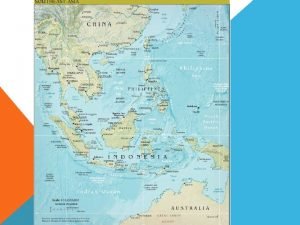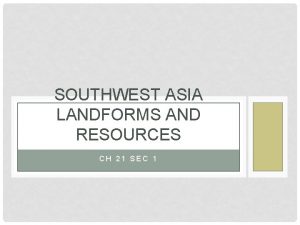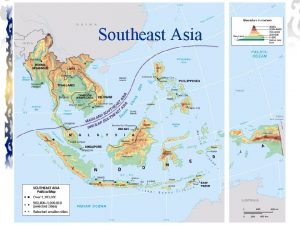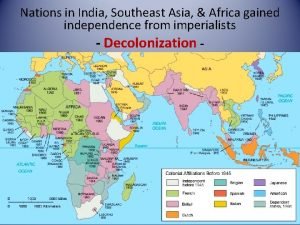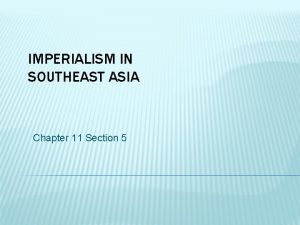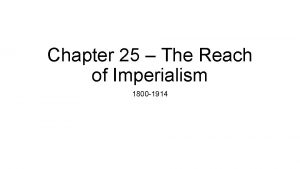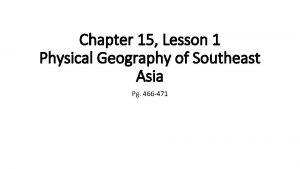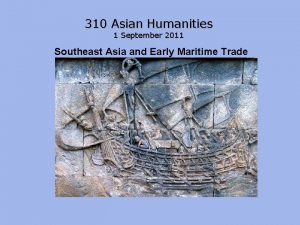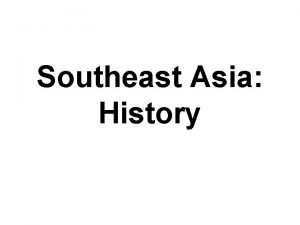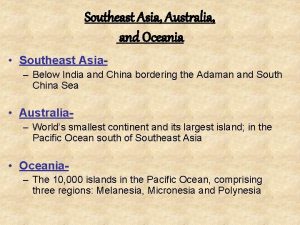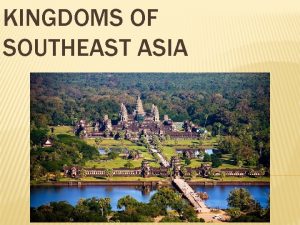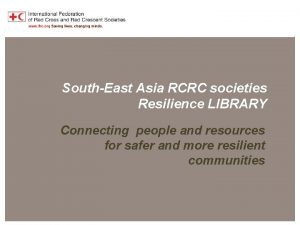Southeast Asia Network of Climate Change focal points












- Slides: 12

Southeast Asia Network of Climate Change focal points (SEAN-CC) EU Capacity Building Side Event June 13, 2011, Bonn, Germany

South east Asia Network of Climate Change Focal Points Outline of presentation q Introduction q Achievements of the Network q Scaling-up to a regional pilot CTCN q Opportunities and challenges

Southeast Asia Network of Climate Change focal points § Guide ASEAN countries make sound policy, technology, and investment choices that lead to a reduction in greenhouse gas emissions and potential co-benefits § Funded by the Government of Finland

A country driven approach Overall priorities jointly identified with CC focal points in bi-annual meetings Transversal activities are also developed building on direct country requests Tailored Support § Help countries establishing an enabling environment and appropriate mechanisms for low carbon development and the transfer of climate technologies § Support countries for their participation in UNFCCC negotiations and to implement related decisions Facilitating knowledge generation and sharing Meetings, seminars, conferences and online platform Providing sector specific technical assistance & policy advice For concrete national & regional actions Providing targeted capacity building Tailored training programmes and workshops

Achievements (since 2009) Capacity support to National CC Focal Points (UNFCCC negotiations, GHG inventories, National Communications & programmatic CDM) Support and capacity building for climate technology transfer (climate technology trainings, feasibility studies/market assessments, technical studies and technology manuals) Knowledge and information sharing (regional analyses and reviews, knowledge sharing platform/website) Partnerships with regional institutions and centers for the promotion of clean and efficient energy technologies

Harmonization of Energy Efficiency Standards Why? q Efficiency standards are an effective method of transforming the market and slowing the electricity demand growth q Standards remove from the market the less efficient appliances What? q Feasibility study - harmonizing ACs & refrigerator standards q Workshop and development of a Strategic Roadmap for harmonizing EE standards for ACs in ASEAN (completed) q Fund mobilization for harmonization of standards for ACs (ongoing)

Leveraging Partnerships ASEAN Energy Manager Accreditation Scheme (AEMAS) q Build managerial and business skills of energy managers (125 training workshops for energy managers) q Improve professional standing and credibility (over 3, 500 trained and certified energy managers) q Provide commercial benefits to end-user (over 2, 500 certified energy end-users; alignment with ISO 50001) Role of SEAN-CC: q SEAN-CC/UNEP became an official associate of AEMAS in 2011 q Provision of expertise to project team members to develop the training tools, guidelines, as well as implement training workshops

Support for UNFCCC Negotiations Why? q Institutional support arrangements and capacity of staff working on cc not keeping pace with the rising demands q The number of issues they deal with are increasing as the climate agenda expands q Obligations and opportunities for reporting, providing information and contributing to the UNFCCC are on the rise What? q Analysis and regular updates on the status of negotiations q Introduction to new concepts and their implications q Expert debriefing of recent talks q Technical support during the negotiating sessions

Scaling up q No technological solution to climate change will materialize without sufficient levels of investment capital q Critical to link the upstream enabling technical assistance to finance to foster investments for climate technology transfer q Investments must support both the development of new, promising technologies, and the large-scale deployment of existing technologies Pilot Asia-Pacific Climate Technology Network and Finance Center q A joint UNEP-As. DB proposal aiming at contributing to the COP decision on the TM by testing on a pilot basis a regional CTCN approach for Asia and the Pacific

Pilot Asia-Pacific Climate Technology Network and Finance Center Country Readiness UNEP Support governments adopt appropriate enabling environments and remove obstacles for climate technology transfer Access to finance As. DB Facilitating investment and mobilizing finance for priority technology investments Demonstrate effectiveness of linking technology & finance mechanisms in catalyzing climate actions

Challenges & Opportunities q Lack of in-country capacity and enabling policies (e. g. for designing, implementing and monitoring specific climate technology activities) – demand outstripping supply. q Capacity support is an integral part of many of the processes initiated by the UNFCCC: National Communications, Technology Needs Assessments, NAPAs, CDM. q Capacity support needs to be integrated into broader climate adaptation & mitigation action (REDD+, technology, EBA etc. ). q Targeted training for project development is a prerequisite for bankable public and private investments. q Few question value of building capacities, policy development but these activities play a small role in climate finance thinking

http: //www. unep. org/Climate. Change/mitigation/sean-cc/ For more info, please check/contact us at: Rajiv. Garg@unep. org Jonathan. Duwyn@unep. org Jerome. Malavelle@unep. org
 Climate change 2014 mitigation of climate change
Climate change 2014 mitigation of climate change Southeast asia climate
Southeast asia climate Weaving the web of an indian ocean world
Weaving the web of an indian ocean world African city model
African city model Chapter 21 section 1 landforms and resources answer key
Chapter 21 section 1 landforms and resources answer key Mainland southeast asia countries
Mainland southeast asia countries Is india southeast asia
Is india southeast asia Imperialism in southeast asia chapter 11 section 5
Imperialism in southeast asia chapter 11 section 5 Imperialism in southeast asia chapter 27 section 5
Imperialism in southeast asia chapter 27 section 5 Chapter 25 lesson 1 colonial rule in southeast asia
Chapter 25 lesson 1 colonial rule in southeast asia Chapter 15 lesson 1 physical geography of north africa
Chapter 15 lesson 1 physical geography of north africa Imperialism in southeast asia chapter 27 section 5
Imperialism in southeast asia chapter 27 section 5 Southeast asian alphabets
Southeast asian alphabets

